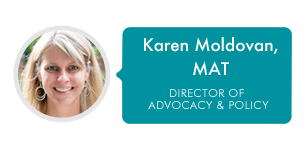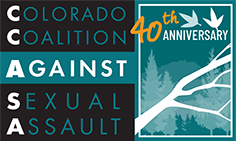By Karen Moldovan, CCASA’s Director of Advocacy & Policy
Throughout my career, I’ve consistently worked with women (and girls) who are pregnant. As an advocate at a domestic violence shelter, it was not uncommon for pregnant women to access residential and other supportive services. When I became a teacher at a Florence Crittenton program, all of my students were pregnant and/or parenting teen girls, between the ages of 12 and 18. In those settings, it wasn’t uncommon to have conversations about morning sickness, baby names, back aches, and the logistics of getting to and from countless OBGYN appointments. While those conversations came easy, I gradually realized how complicated it was to have conversations beyond the more mundane pregnancy and birth talk. As I was able to build trust with the women and girls I worked with, I slowly learned about the mounting physical and emotional safety needs that were often a quiet struggle. One student was a twelve year old 7th grader, who flatly refused to tell anyone, anything about the male who was no doubt involved in her pregnancy. Yet other students would quietly murmur about how the biological father was a grown man, and she didn’t want to get him in trouble. Apparently her family didn’t want to get him in trouble either, because he did have steady employment and would be able to financially provide for the baby.
Still to this day, it’s painful to think about the struggles of many of these young women. Pregnancy was often closely intertwined with intimate partner violence, incest, inter-familial sex trafficking, and rape. There was a young women who refused to speak about or even acknowledge her pregnancy, a young woman who confided that she could not hold her baby daughter without breaking down into tears due to the flood of traumatic memories she could not stop, and the young woman who flatly refused seeking any sort of child support because the most important thing was being away from the man who impregnated her. I bring up these cases because they changed me as an Advocate. Now I look back and see that the context of the pregnancy was often the “elephant in the room.” As an advocate, baby names and OBGYN appointments felt okay to bring up, but I really didn’t talk integrate the following facts into my work:
- Approximately one in five young women said they experienced pregnancy coercion and one in seven said they experienced active interference with contraception (National Crime Victimization Survey, 2005).
- Girls who are victims of dating violence are 4 to 6 times more likely than non-abused girls to become pregnant (Silverman, 2004).
- As many as two-thirds of adolescents who become pregnant were sexually or physically abused some time in their lives (Leiderman, 2001).
- Homicide is the second leading cause of traumatic death for pregnant and recently pregnant women in the U.S. (Chang, 2005).
Considering what we know about perpetrators of intimate partner violence (and the power and control they demand), it should not be surprising that sexual coercion and forced pregnancy are frequently used as tools of abuse. This abusive behavior may manifest as threats and/or violence if a partner does not comply with the perpetrator’s wishes regarding contraception or the decision whether to terminate or continue a pregnancy. It may manifest as intentionally interfering with the couple’s birth control, or forcing invasive fertility treatments.
In my own personal life, my partner and I have spent the past two years seeking medical advice and intervention regarding (in)fertility. In our journey to try and become parents, we’ve seen numerous doctors and medical professionals. When exchanging small-talk before or after an appointment, they’ve all asked me what I do for work. As I explain CCASA, the tone of the conversation shifts, and more than one Fertility Specialist has shared case examples of reproductive coercion. One case involved a couple coming in to seek in-vitro fertilization (IVF). The Doctor just sensed something wasn’t right and (smartly) decided to talk to the husband and the wife separately. When separated, the wife confided to the Doctor that she didn’t want to be pregnant and didn’t want to do IVF, but that her husband was forcing her. Another Doctor told me about a situation where she had performed an Intrauterine Insemination (IUI) procedure for a couple, which was successful and resulted in twins. Shortly after, the couple was back with the husband demanding IVF. The Doctor was perplexed by both his urgency and demeanor. Within a couple months of that appointment, the husband was arrested for both child abuse and domestic violence. When these stories have been relayed to me, the Doctors each seemed incredibly saddened, baffled, and unsure of how to both identify warning signs and respond appropriately.
Because October is Domestic Violence Awareness Month, I think it’s important for all of us to think about how we can collaboratively improve outreach and awareness around reproductive coercion and the unique considerations of survivors who are pregnant. I’ve found that health care providers want assistance with these issues, yet are often just too busy to be the ones outreaching to community agencies. The good news is resources are available. Futures Without Violence (www.futureswithoutviolence.org) has numerous, groundbreaking tools for addressing reproductive coercion and facilitating cross training and collaboration between health care providers and advocates. Penny Simkin and Phyllis Klaus’s book, “When Survivors Give Birth: Understanding and Healing the Effects of Early Sexual Abuse on Childbearing Women” is a must-read for anyone working directly with survivors who are pregnant. Research determines that a physically-abused woman also experiencing forced sex [is] over seven times more likely than other abused women to be killed (Campbell, 2003). In light of this horrific statistic, these conversations are absolutely worth having.
 Karen Moldovan is the Program Manager for the Colorado Coalition Against Sexual Assault (CCASA). She joined CCASA with strong experience in advocacy, education, community organizing and international development. Her professional experience has often focused on working with survivors of domestic violence and sexual assault, individuals experiencing homelessness, and pregnant and parenting youth. Karen has a Bachelor’s Degree in Political Science and Gender Studies, and a Masters of Arts in Teaching. In 2009, she completed service as a United States Peace Corps Volunteer in the Kingdom of Tonga. She is a founding member of First Response Action, which advocates for comprehensive reform for sexual assault prevention and response within the Peace Corps.
Karen Moldovan is the Program Manager for the Colorado Coalition Against Sexual Assault (CCASA). She joined CCASA with strong experience in advocacy, education, community organizing and international development. Her professional experience has often focused on working with survivors of domestic violence and sexual assault, individuals experiencing homelessness, and pregnant and parenting youth. Karen has a Bachelor’s Degree in Political Science and Gender Studies, and a Masters of Arts in Teaching. In 2009, she completed service as a United States Peace Corps Volunteer in the Kingdom of Tonga. She is a founding member of First Response Action, which advocates for comprehensive reform for sexual assault prevention and response within the Peace Corps.

